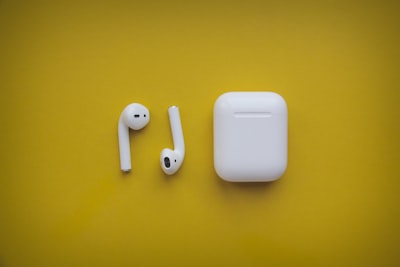Apple AirPods have become a popular option for those seeking a convenient and seamless audio listening experience. These wireless earbuds offer an array of features that make them stand out from the competition, from their easy connectivity to the wide range of compatible devices. As a potential buyer, you might be wondering how these earbuds perform in terms of sound quality, comfort, and, most importantly, their price point.
There are several factors to consider when evaluating AirPods as a suitable addition to your tech arsenal. Understanding the distinct characteristics of different AirPod models, their accompanying reviews, and their pricing is essential to making an informed decision about whether or not they’re worth the investment. This article will delve into the nitty-gritty of Apple AirPods Wireless Earbuds, providing insights into their pros and cons while evaluating their value for money.
Key Takeaways
- Apple AirPods offer a convenient and user-friendly listening experience
- Different models cater to varying price points and feature preferences
- Thoroughly understanding the earbuds’ performance and costs is crucial before making a purchase decision.

Apple AirPods Wireless Earbuds Reviews and Prices
Apple AirPods Noise Cancellation Review
Apple AirPods Pro offers Active Noise Cancellation (ANC) for immersive sound experiences. With ANC, you can filter out background noises, allowing you to focus on your music, podcasts, or phone calls. In challenging environments, Transparency Mode enables you to stay aware of your surroundings—simply switch it on for a more natural listening experience.
Apple AirPods Audio Quality Review
Apple AirPods are known for their clear and crisp audio quality. Spatial audio with dynamic head tracking is available in AirPods Pro and AirPods (3rd Gen) for a more immersive sound experience. This feature creates a three-dimensional audio sensation by applying directional audio filters and adjusting the frequencies.

Apple AirPods Charging Speed and Battery Life Review
AirPods offer a decent battery life to keep you connected throughout the day. With a full charge, AirPods Pro provides up to 4.5 hours of listening time, while AirPods (3rd Gen) provide up to 6 hours. Both models come with a wireless charging case that extends total listening time up to 24 hours. Additionally, a quick 5-minute charge gives you around 1 hour of listening time or talk time.
Apple AirPods Water-Resistance Review
Your AirPods Pro are sweat and water-resistant with an IPX4 rating. This means they can withstand splashes and sweat during workouts, but it’s not advisable to submerge them in water. The standard AirPods, however, are not water-resistant, so extra caution should be taken around liquids.
Apple AirPods Connectivity and Bluetooth Review
Apple AirPods offer reliable Bluetooth connectivity and effortless pairing with Apple devices. The H1 chip ensures a stable wireless connection, making it easy to switch between your iPhone, iPad, and other Apple products. They also support hands-free “Hey Siri” voice commands for convenient access to Apple’s digital assistant.

Overall, Apple AirPods deliver great audio quality, noise cancellation, and seamless connectivity—but at varying price points. The AirPods Pro retail for $199, providing top-notch ANC and spatial audio. For a more budget-friendly option, consider the AirPods (3rd Gen) at $179, offering similar features without ANC.
Are Apple AirPods Really Worth the Money?
When it comes to wireless earbuds, Apple AirPods are undoubtedly among the most popular options on the market. With a range of models and features available, you might be wondering if they’re worth the investment. Let’s take a closer look at what to expect from the Apple AirPods lineup.
For a more affordable option, Apple’s basic AirPods start at $159 and include wireless charging capabilities. In contrast, the AirPods Pro cost around $249, offering additional features such as noise cancellation, adaptive EQ, and water resistance with an IPX4 rating.
The AirPods Pro model is designed with custom ear tips to provide a more secure and comfortable fit, which is beneficial for extended listening sessions. The noise cancellation and adaptive EQ features enhance the audio quality by adjusting the sound to the shape of your ear. Additionally, Siri integration allows hands-free control, making these earbuds a convenient option for iPhone and Mac users.

In terms of audio quality, AirPods may not match up to some of their competitors, such as Sony and Bose. If you prioritize high-quality sound and performance, Bose QuietComfort Earbuds II are an alternative to consider, as these offer rich bass and arguably better noise cancellation than the AirPods Pro.
It’s also worth comparing AirPods to other Apple products like Beats, which fall within the same price range but focus more on bass-heavy audio. For those looking for an over-ear option, the premium AirPods Max offer superior sound quality and advanced features, albeit at a significantly higher price point.
Ultimately, the decision to invest in AirPods depends on your preferences and priorities. If you value seamless integration with your Apple devices, convenience, and a sleek design, AirPods might be the right choice for you. However, if you’re more focused on audio quality and performance, it’s worth exploring other options from brands like Sony, Bose, or even Apple’s own Beats lineup.

What Are the Pros and Cons of AirPods?
When it comes to Apple AirPods, there are plenty of aspects to consider. In this section, we’ll outline some of the key pros and cons related to these wireless earbuds, to help you make informed decisions about their suitability for your needs.
One noticeable advantage of AirPods is their compatibility with various Apple products. Whether you own an iPhone, iPad, or MacBook, AirPods will seamlessly integrate into your ecosystem. With the H1 chip, you can also expect automatic switching, enabling smoother transitions between devices.

The third-generation AirPods feature an updated design, boasting better ergonomics, improved sound quality, and an IPX4 rating for sweat and water resistance. This versatility makes them suitable for everyday use, as well as during workouts where you’re more likely to break a sweat.
Read also: Can AirPods Be Shared?
As an Apple product, AirPods support a range of advanced features, such as personalized spatial audio, transparency modes, and dynamic head tracking. These capabilities enhance your listening experience, especially when used in conjunction with Apple Music and Dolby Atmos, providing immersive soundscapes.
However, there are drawbacks to consider as well. Although AirPods offer a generally comfortable fit, they may not be ideal for everyone. Unlike some competitors in the market such as Jabra, Apple’s earbuds don’t come with customizable ear tips to ensure a secure and personalized fit. Over time, this can lead to discomfort or instability for some users.

Volume control is another area where AirPods may fall short. Current models lack physical buttons for adjusting the volume or changing tracks, relying instead on Siri commands. This can be an inconvenience, especially in situations where you’d rather not interrupt your listening to issue verbal commands.
Read also: Can You Wear AirPods With A Rook Piercing?
While AirPods are competent earbuds, they may not be the best choice for users who prefer over-ear headphones. The Beats Fit Pro, another popular option within the Apple family, offers a similar feature set in an over-ear format, which some users might find more comfortable or suitable for their needs.

Lastly, AirPods come with a premium price tag compared to alternatives in the market. Although some consumers may be willing to pay extra for the compatibility and features provided by Apple products, others may find more affordable alternatives that still deliver comparable performance.
Considering these pros and cons, it’s essential to weigh your preferences and requirements when choosing wireless earbuds. While the AirPods offer plenty of benefits, there are also drawbacks that may make other options more suitable for your needs.

Wireless Range of AirPods
When it comes to wireless range, your AirPods provide a reliable connection within a typical Bluetooth range. They can maintain a strong connection with devices like your iPhone, Apple Watch, and computers, covering up to 30 feet or more under ideal conditions. This means you can enjoy seamless pairing with your tablet computers and smartphones without worrying about losing connection.
Read also: Why Are Airpods Not Disconnecting When In Case?
The available AirPods models, including AirPods 2, AirPods 3, and AirPods Pro (1st gen), offer similar wireless range capabilities. The latest and more advanced model, Apple AirPods Max, also boasts robust Bluetooth connectivity despite being larger and heavier compared to the earlier models.
While using your AirPods, you can expect to have a listening time of up to 4.5 to 5 hours on a single charge for AirPods Pro and up to 6 hours for AirPods 3, as reviewed by CNET. The wireless headphones also provide you with handy notifications when the battery levels are low, allowing you to plan for a quick charge.

Your AirPods’ FindMy technology enables you to locate them in case they go missing within their coverage area. For an even more impressive Bluetooth range, you may want to consider options like the Sony WF-1000XM4 wireless earbuds, which offer a wider coverage.

Remember, the availability of different AirPods models might vary, so it’s essential to stay updated on their release dates and pricing information. As for the AirPods Pro 2, we don’t have any official information about the features and pricing yet, but we can expect improvements and refinements in the future models.
Read also: How To Reset AirPods Pro From A Previous Owner: Step-By-Step Guide




